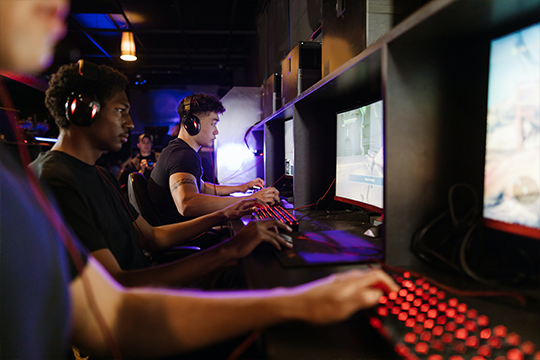The idea of having VU Amsterdam compete in the Dutch Student League (DSL) came from finance student Ferdi Kabak. He organizes campus events in 3D and asked around if anyone was interested in competing in the tournament. Although he plays some League of Legends, he doesn’t consider himself good enough to compete and is cheering on the teams instead. He says the tournament has been very chaotic so far, as the communication by the organizers can be very last-minute.
The DSL kicked off in February and has universities facing off against each other on a weekly basis. The matches are played online, from home, but the grand finale will be a live event. The victorious League of Legends team gets 5,000 euros and there is another 2,000 euros reserved for the best Rocket League team. The VU teams are comprised of mostly VU students, but a couple of outsiders have joined in as well.
Tempered expectations
The Rocket League team first had to determine if they could play in division A or B. By winning three out of four matches, they made it into the higher division. But then they got off to a rocky start.
“We got smacked quite hard by the Amsterdam University of Applied Sciences” (AUAS), says one of the Rocket League players. His teammate adds that AUAS is the tournament’s most favored team. “And I saw they qualified for some European tournament as well. So I would say we’re maybe going for second place.” Computer science student Gil Boewer (20) is more optimistic: “If you strive for first, maybe you still become second. But you could also become first.”
‘It’s hard to compete with teams that have been playing together for a year or longer’
On the League of Legends side, the team also had a rough start and lost the first three matches. “It’s quite hard to compete with other universities when their teams have been playing together for a year or longer”, says Computer science student Dominik Laifr. Meanwhile, the VU team had barely a month to get acquainted with each other. “We are definitely proud of the progress we have made the past four weeks”, says Laifr.
Keeping it fun
Many of the VU students playing in the tournament are new to competing in big gaming tournaments, though some have dabbled in it before. The DSL gives student an opportunity to try out the competitive scene, as well as meet other students who are passionate about the same games. The VU teams generally appear more driven by fun than they are by glory or prize money.
That priority is also reflected in the students’ relaxed training schedules. The League of Legends team gets together once or twice a week to practice. Meanwhile, the Rocket League players are taking an even more minimalistic approach. “I think we practiced like one game before the qualifiers”, says Gil Boewer. “Actually, do you guys want to practice today?”, he adds laughingly.
Tired of playing
The group does have one actual pro gamer in its midst, or rather a former pro-gamer. Niels Kok (26) was among the first professional Rocket League players in the Netherlands and competed in various tournaments from 2017 to 2019. He started playing for fun, but as he became better and better, he joined big tournaments and won thousands of euros.
‘Eventually, you become mentally exhausted and don’t want to play the game anymore’
“It’s pretty rough, because it becomes your job if you play professionally. So you have to play like fifty to sixty hours a week. Eventually, you become mentally exhausted and don’t want to play the game anymore, but you have to.” That, alongside internal politics within his former team, made Kok put an end to his gaming career and study Computer science at VU Amsterdam.
Sometimes he does still get the urge to give it another shot, “but then you start playing again and you realize how much better everyone has gotten. The best players in Rocket League now are like 15 or 16 years old.”
Gaming association
Whether VU Amsterdam will come out on top in the DSL remains to be seen, as the tournament will continue until May. Either way, it’s doubtful this will be the last time that VU students will team up in a big gaming competition. There is a noticeable increase in gaming events taking place on campus, oftentimes organized by Life is Better in 3D. If it’s up to Ferdi Kabak, the next step will be the creation of a brand new student association focused on gaming. Not only for VU Amsterdam, but for all the universities in the city.
